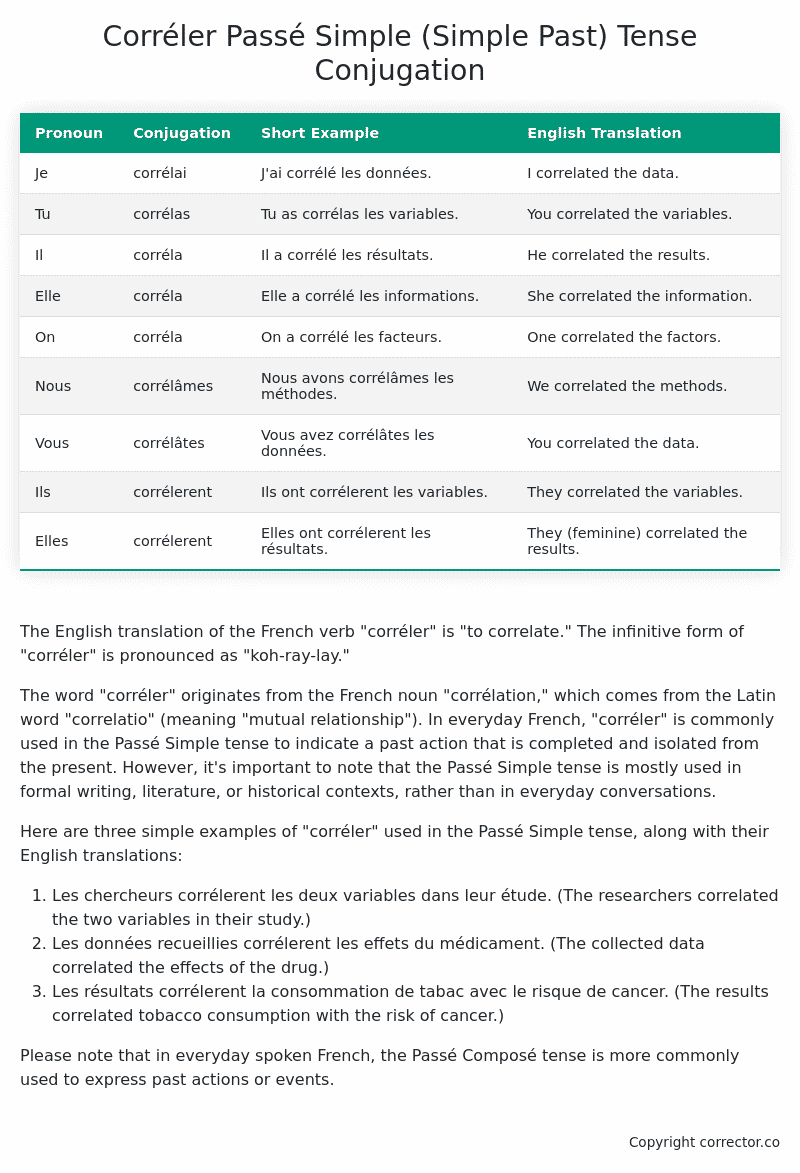Passé Simple (Simple Past) Tense Conjugation of the French Verb corréler
Introduction to the verb corréler
The English translation of the French verb “corréler” is “to correlate.” The infinitive form of “corréler” is pronounced as “koh-ray-lay.”
The word “corréler” originates from the French noun “corrélation,” which comes from the Latin word “correlatio” (meaning “mutual relationship”). In everyday French, “corréler” is commonly used in the Passé Simple tense to indicate a past action that is completed and isolated from the present. However, it’s important to note that the Passé Simple tense is mostly used in formal writing, literature, or historical contexts, rather than in everyday conversations.
Here are three simple examples of “corréler” used in the Passé Simple tense, along with their English translations:
- Les chercheurs corrélerent les deux variables dans leur étude. (The researchers correlated the two variables in their study.)
- Les données recueillies corrélerent les effets du médicament. (The collected data correlated the effects of the drug.)
- Les résultats corrélerent la consommation de tabac avec le risque de cancer. (The results correlated tobacco consumption with the risk of cancer.)
Please note that in everyday spoken French, the Passé Composé tense is more commonly used to express past actions or events.
Table of the Passé Simple (Simple Past) Tense Conjugation of corréler
| Pronoun | Conjugation | Short Example | English Translation |
|---|---|---|---|
| Je | corrélai | J’ai corrélé les données. | I correlated the data. |
| Tu | corrélas | Tu as corrélas les variables. | You correlated the variables. |
| Il | corréla | Il a corrélé les résultats. | He correlated the results. |
| Elle | corréla | Elle a corrélé les informations. | She correlated the information. |
| On | corréla | On a corrélé les facteurs. | One correlated the factors. |
| Nous | corrélâmes | Nous avons corrélâmes les méthodes. | We correlated the methods. |
| Vous | corrélâtes | Vous avez corrélâtes les données. | You correlated the data. |
| Ils | corrélerent | Ils ont corrélerent les variables. | They correlated the variables. |
| Elles | corrélerent | Elles ont corrélerent les résultats. | They (feminine) correlated the results. |
Other Conjugations for Corréler.
Le Present (Present Tense) Conjugation of the French Verb corréler
Imparfait (Imperfect) Tense Conjugation of the French Verb corréler
Passé Simple (Simple Past) Tense Conjugation of the French Verb corréler (You’re reading it right now!)
Passé Composé (Present Perfect) Tense Conjugation of the French Verb corréler
Futur Simple (Simple Future) Tense Conjugation of the French Verb corréler
Futur Proche (Near Future) Tense Conjugation of the French Verb corréler
Plus-que-parfait (Pluperfect) Tense Conjugation of the French Verb corréler
Passé Antérieur (Past Anterior) Tense Conjugation of the French Verb corréler
Futur Antérieur (Future Anterior) Tense Conjugation of the French Verb corréler
Subjonctif Présent (Subjunctive Present) Tense Conjugation of the French Verb corréler
Subjonctif Passé (Subjunctive Past) Tense Conjugation of the French Verb corréler
Subjonctif Imparfait (Subjunctive Imperfect) Tense Conjugation of the French Verb corréler
Subjonctif Plus-que-parfait (Subjunctive Pluperfect) Tense Conjugation of the French Verb corréler
Conditionnel Présent (Conditional Present) Tense Conjugation of the French Verb corréler
Conditionnel Passé (Conditional Past) Tense Conjugation of the French Verb corréler
Conditionnel Passé II (Conditional Past II) Tense Conjugation of the French Verb corréler
L’impératif Présent (Imperative Present) Tense Conjugation of the French Verb corréler
L’impératif Passé (Imperative Past) Tense Conjugation of the French Verb corréler
L’infinitif Présent (Infinitive Present) Tense Conjugation of the French Verb corréler
L’infinitif Passé (Infinitive Past) Tense Conjugation of the French Verb corréler
Le Participe Présent (Present Participle) Tense Conjugation of the French Verb corréler
Le Participe Passé (Past Participle) Tense Conjugation of the French Verb corréler
Struggling with French verbs or the language in general? Why not use our free French Grammar Checker – no registration required!
Get a FREE Download Study Sheet of this Conjugation 🔥
Simply right click the image below, click “save image” and get your free reference for the corréler Passé Simple tense conjugation!

Corréler – About the French Passé Simple (Simple Past) Tense
Formation
Usage
Narration
Historical Context
Interactions with other tenses
Passé Composé
Imparfait
Conditional and Subjunctive
Summary
I hope you enjoyed this article on the verb corréler. Still in a learning mood? Check out another TOTALLY random French verb conjugation!


